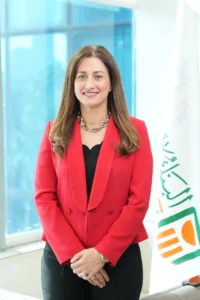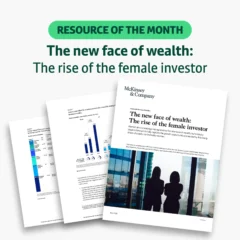
As Egypt’s oldest and largest financial institution, the National Bank of Egypt (NBE) has been central to the country’s financial sector and economic development since 1898. Initially serving dual functions as both commercial and central bank until 1950, NBE has continued to support the Central Bank of Egypt as needed.
Today, NBE commands over 37 percent of Egypt’s total banking assets and deposits. Serving more than 20 million clients, the bank operates through an extensive domestic network of over 650 branches and more than 6,700 ATMs, complemented by robust digital platforms.
In this interview, Deputy CEO Soha El-Turky shares the bank’s approach to serving Women’s Markets.
Alliance: Could you share the overall strategic vision for NBE?
El-Turky: Customer-centricity is at the heart of our 2024–2027 strategic vision, which is built around six key pillars that reflect both our legacy and our long-term direction. We are reimagining customer experiences and tailoring offerings to better meet the evolving needs of individuals and businesses alike. At the same time, we are deepening our commitment to financial inclusion and our national development role by expanding access to underserved communities. Our digital transformation agenda is accelerating, with a strong focus on AI adoption and data-driven decision-making. We are also optimizing profitability through diversified growth and disciplined risk management, while creating greater value through synergies across our group entities. Finally, sustainability is an integral part of our strategy, as we work to embed ESG principles into all aspects of our operations and promote sustainable finance in support of Egypt’s Vision 2030. Through this comprehensive and forward-looking approach, these pillars enable us to fulfill our dual mandate: maintaining financial leadership while actively contributing to inclusive growth, economic resilience, and social impact in Egypt and beyond.
Alliance: Focusing on the women’s economy, could you elaborate on which women’s segments you are prioritizing and what unique value propositions you are considering for them?
El-Turky: At NBE, we recognize that women are not a homogenous segment, as they play multiple economic roles as entrepreneurs, professionals, homemakers, and contributors to family businesses. Our approach reflects this diversity by addressing their distinct financial roles and needs.
We are prioritizing women entrepreneurs by designing tailored financing solutions, advisory support, and capacity-building programs that help them grow their businesses and access new markets, often through partnerships with development organizations. One example of this is the Women Rise Bundle: a comprehensive solution designed to empower women in the artisan sector by providing them with training, mentorship, and innovative e-commerce solutions.
We are also focusing on salaried and professional women, providing personalized savings, investment, and insurance products that align with their financial goals and life stages. And, we are working to bring unbanked and underserved women, particularly in rural and semi-urban areas, into the formal financial system through simplified digital products and financial literacy initiatives.
Our overall value proposition embodies a holistic approach that goes beyond access to finance: it is rooted in creating a supportive ecosystem that combines capital, knowledge, and digital tools. By offering flexible terms, user-friendly services, and non-financial support, we aim to empower more women to take control of their financial futures and participate fully in Egypt’s economic growth.
Alliance: What roles do digital financial services play in your financial inclusion strategy, particularly for women?
El-Turky: Digital financial services are a cornerstone of NBE’s financial inclusion strategy, particularly when it comes to reaching and empowering women. For many women, digital solutions help overcome long-standing barriers to financial access, including mobility constraints, time limitations due to family responsibilities, or limited presence in the formal economy. Our approach is designed to make banking more accessible, relevant, and empowering.
Through secure, user-friendly mobile and internet banking platforms, we enable women to open accounts and manage their finances independently, without needing to visit a branch. We are expanding the reach and functionality of NBE PhoneCash (our e-wallet) and QR-code payment solutions, which have proven especially valuable for women entrepreneurs managing SMEs, home-based businesses, and e-commerce ventures. We are also extending agent banking and mobile ATMs in remote areas to further expand access.
Financial literacy is core to our approach. We use digital channels to deliver e-learning content, awareness campaigns, and in-app guidance that help women build financial confidence and capability. For women-led SMEs, we’ve introduced tailored digital products with simplified onboarding, access to financing, and digital advisory tools.
The real value of these efforts lies in how digitalization reduces cost, increases convenience, and levels the playing field.
Alliance: Egypt is working to strengthen its support for women entrepreneurs. How does NBE envision contributing to national strategies and policies in this space, particularly through the WE Finance Code?
El-Turky: NBE views the empowerment of women entrepreneurs as both a national priority and a powerful driver of inclusive economic growth. In alignment with Egypt’s Women’s Empowerment Strategy 2030 and through our commitment to the WE Finance Code, NBE is positioning itself as a catalyst for systemic change. We have embedded gender finance as a pillar within our business model, supported by strong institutional leadership, clear governance, and dedicated partnerships. Our approach is increasingly data-driven, using our scale and digital infrastructure to inform product innovation, narrow financing gaps, and support evidence-based national policy dialogue.
Recognizing that access to finance alone is not enough, we are building an integrated ecosystem that combines dedicated credit lines with non-financial services such as mentorship, financial literacy programs, and advisory support to help women-led businesses grow sustainably. Additionally, we are continuing to expand strategic partnerships with institutions), like the EBRD and local NGOs, to build capacity, leverage technical expertise, and support regulatory incentives that facilitate women’s access to finance.
Through this multi-dimensional approach, and by fully aligning with the WE Finance Code, NBE aims to drive a meaningful shift in how women engage with the financial system so they can contribute directly to Egypt’s national development goals and global competitiveness.
Alliance: Capturing sex-disaggregated data is essential for establishing a baseline for a women’s market program. However, many banks face challenges due to legacy systems, etc. Where do you stand in your gender data journey?
El-Turky: We recognize that robust data is the backbone of effective policy and product design. NBE is beginning to integrate gender-disaggregated data within its customer information systems and analytics frameworks. The goal is to have end-to-end visibility across our customer base to track women’s participation, monitor performance, and assess impact. While legacy systems pose challenges, we are investing in digital infrastructure upgrades to improve data granularity and accuracy. This effort will enable us to design more responsive products and measure progress toward our inclusion goals.
Alliance: Internal diversity and inclusion are crucial for effectively serving the women’s market. Could you provide an overview of female representation within NBE and share one or two key initiatives that have driven progress?
El-Turky: At NBE, we believe that internal inclusion drives external impact. We continue monitoring our gender data as we work towards equal employment opportunities under which gender equality is a defined KPI. Today, 25% of our Board members and 34% of our workforce are females. As part of our efforts to improve gender-disaggregated outcomes, it is worth highlighting that 42% of our recent hires are females, along with 55% of our summer internship cohort. Moving forward, we are working to substantially increase female representation among our branch managers, which is an important step toward strengthening gender diversity across leadership roles.
In parallel, NBE actively invests in the professional development of its female employees through tailored programs such as Empowering Women for Organizational Excellence which focuses on strengthening women’s leadership capabilities. Through initiatives like the Annual Breast Cancer internal campaign, we reinforce the message that diversity and inclusion are not limited to career advancement but are embedded in every aspect of the employee experience.
Alliance: Why did you decide to join the Alliance, and what do you hope to learn from or share with the network?
El-Turky: Joining the Alliance reflects our commitment to collaboration, learning, and collective impact. We believe that gender-inclusive finance is not a competitive space but a shared responsibility that benefits societies and economies alike. Through the Alliance, we hope to exchange global best practices, access insights on innovative product design and gender data management, and contribute our own learnings from operating in one of the most dynamic growth markets.
We also see this as an opportunity to amplify the voice of Egypt’s financial sector on the global stage and demonstrate how national institutions can lead sustainable change by empowering women to unlock their full economic potential.


